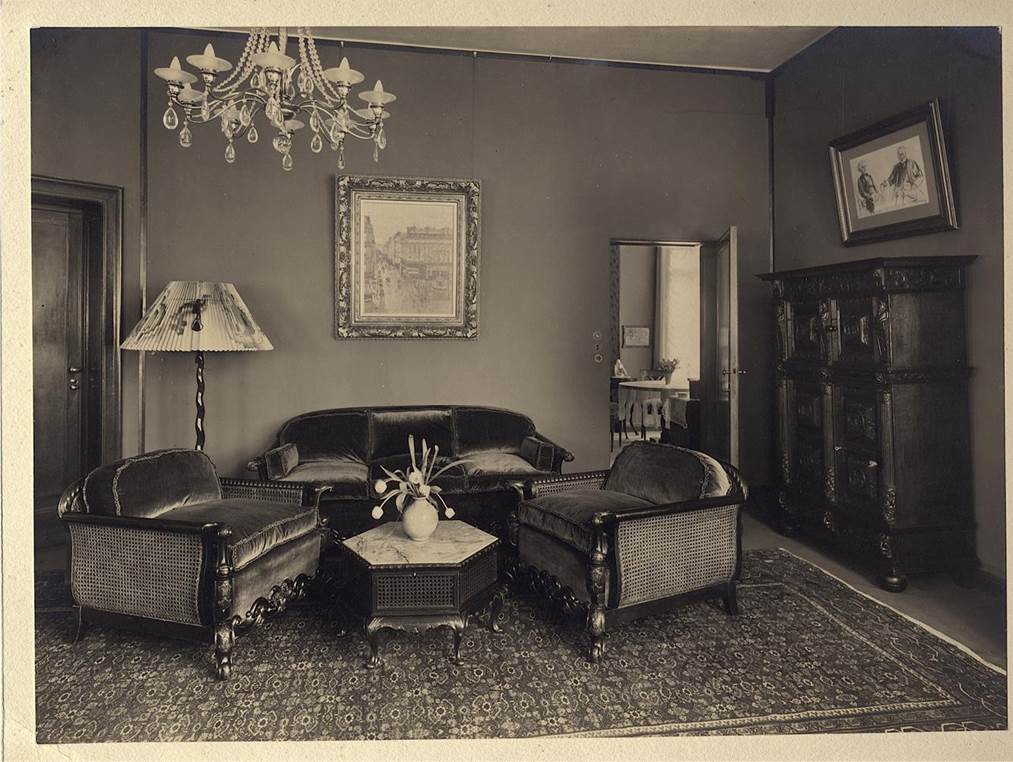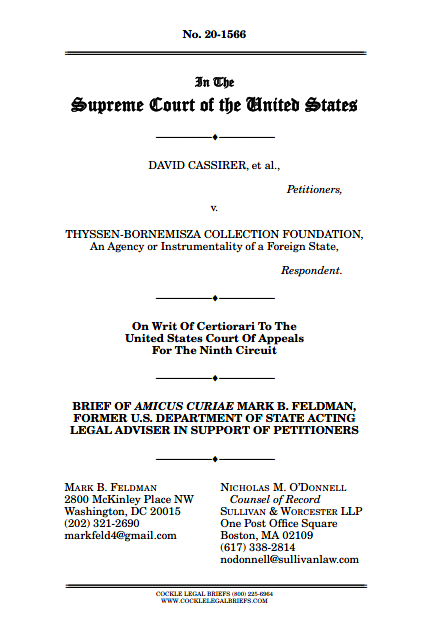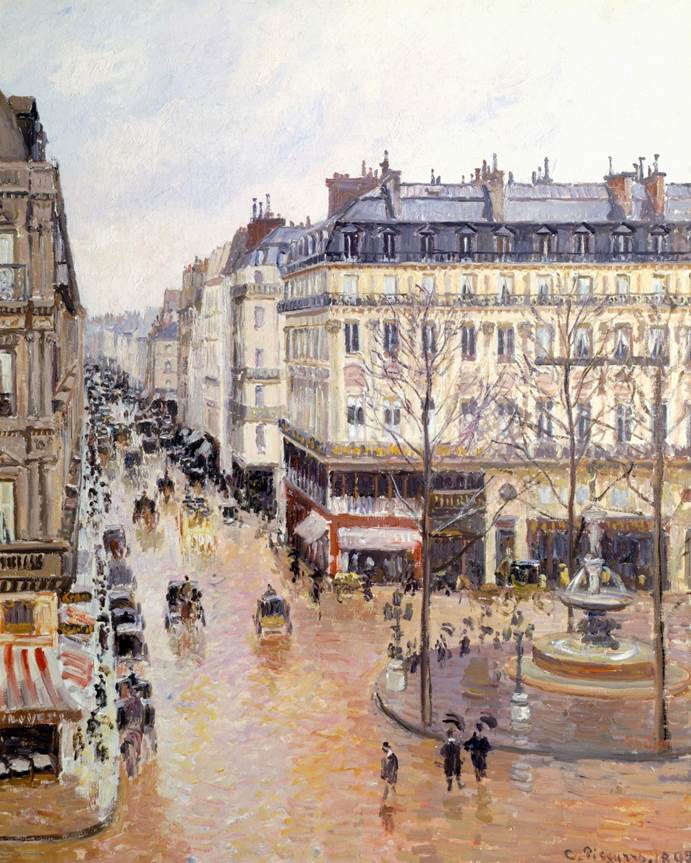I am proud to announce the publication in the Chapman Law Review of my article: “Turnabout is Foul Play: Sovereign Immunity and Cultural Property Claims,” which you can link to here. The abstract of the article is below.
Chapman Law Review Article Spotlights Recent Supreme Court Missteps on Sovereign Immunity and Cultural Property, Calls for Congress to Act
Topics: Second Hickenlooper Amendment, Act of State, Nazi-looted art, Foreign Sovereign Immunities Act, FSIA, expropriation exception”, 28 U.S.C. § 1605(a)(3), Genocide Convention, Nazi-confiscated art, F.R.G. v. Philipp, domestic takings, Chapman Law Review, Turnabout is Foul Play, Sovereign Immunity and Cultural Property Claims, Roberts Court, Taline Ratanjee, Greg Mikhanjian, Anna Ross, Amber Odell, Sara Morandi
Federal Appeals Court Strikes Another Blow to Chabad Cultural Property Claims Against Russia
The U.S. Court of Appeals for the D.C. Circuit recently dismissed a long-running dispute against Russia concerning the library of the Lubavitcher Rebbe (the Library), a collection of books and papers once held by the then-Rebbe of the Chabad Lubavitch movement. Agudas Chasidei Chabad of United States v. Russian Fed’n, 110 F.4th 242 (D.C. Cir. 2024) (Chabad 2024). Brought under what is known as the expropriation exception, 28 U.S.C. § 1605(a)(3), of the Foreign Sovereign Immunities Act (the FSIA), the case has involved Russia’s withdrawal from the case and default, sanctions of $50,000 per day for non-compliance and a judgment of more than $175 million, a retaliatory embargo on cultural property exchange that continues to this day, and multiple appeals.
In the most recent decision, the court of appeals held that the second element of the expropriation exception (what is known as the commercial nexus requirement) was not met and therefore deprived the court of any jurisdiction. Specifically, the D.C. Circuit held that if the defendant is the foreign state, the expropriation exception may only be invoked if the property is physically present in the United States (which the Rebbe’s library is not). The Supreme Court has declined to review two relatively recent cases that reached the same conclusion, it will bear watching of the plaintiffs seek further review now given a circuit split with the 9th Circuit on the issue.
Topics: de Csepel, Immunity from Seizure, Foreign Sovereign Immunities Act, Supreme Court, Agudas Chasidei Chabad, Russian Federation, FSIA, expropriation exception”, sovereign immunity, Russian State Library, Chabad, Federal Republic of Germany, Welfenschatz, D.C. Circuit, Federal Republic of Germany v. Philipp, Simon v. Republic of Hungary, Lubavitcher Rebbe, Schubarth, Judge Randolph, Brett Kavanaugh, Judge Griffith
Thyssen-Bornemisza wins Pissarro painting sold under Nazi duress by Lilly Cassirer
The U.S. Court of Appeals for the 9th Circuit ruled on January 9, 2024 that the Thyssen-Bornemisza Collection Foundation in Madrid is the owner of Rue Saint–Honoré, après-midi, effect de pluie (1892) by Camille Pissarro, a painting sold by German Jew Lilly Cassirer under Nazi duress. After the Cassirer family prevailed in the Supreme Court in 2023 that the 9th Circuit had previously applied the wrong legal test, the question before the 9th Circuit was the choice of which law to apply. In any case where the parties and subject matter are in different jurisdictions (or within overlapping jurisdictions like state and federal), a court must first decide which body of law to apply in analyzing a particular case. Here, the 9th Circuit ruled that Spanish law applied because Spanish law would be harmed more than California law if the other body of law applied (known as comparative impairment analysis). This, in turn, led to the holding that the Thyssen-Bornemisza Collection Foundation acquired good title after holding the painting for long enough that prior claims were extinguished.
The decision is thinly-reasoned. It looks to the “place of relevant conduct” as paramount to choosing applicable law, but concluded that the only relevant conduct was Spain’s purchase in 1993 of the Baron Hans Heinrich Thyssen-Bornemisza’s collection. Not the Baron’s Swiss residence, not his purchase of a stolen painting in New York (not located in Spain when last we checked) in 1976, not the earlier (New York) sale by Knoedler Gallery, nor the painting’s passage through California in the 1950s, nor the source of the defect in the first place: Nazi Germany. Rather, The court insultingly referred to Holocaust survivor and refugee Claude Cassirer’s life in California as a “fortuity.” As the late Justice Antonin Scalia might have said, “pure applesauce.”
The upshot is that a state (Spain, through the TBC) that did not acquire good title to a painting that was indisputably dispossessed by the Nazis will (barring further review) keep this ill-gotten property. Spain should have returned the painting the first time it was asked to do so. Digging its heels in over 18 years of litigation is a mockery of the commitments Spain made in the 1998 Washington Principles on Nazi-Confiscated Art. Nothing about Spanish law is impaired by refusing to honor a transaction at the direction of the Nazis.
The family has vowed to fight on, and good for them. As I often tell people as an example to frame this issue and this case, the picture below is of the painting in Lilly’s home. Now imagine that this was your home, and the very worst person you knew came in and demanded it because he knew you had no power to resist. Would you give up?
Topics: Lilly Cassirer, Rue Saint-Honoré après-midi effet de pluie, Claude Cassirer, Foreign Sovereign Immunities Act, California, Washington Principles on Nazi-Confiscated Art, Spain, FSIA, Camille Pissarro, Ninth Circuit Court of Appeals, Cassirer v. Thyssen-Bornemisza Collection, Jakob Scheidwimmer, Sydney Schoenberg, Eugen Kampf, Antonin Scalia, Hans W. Lange, Federal Republic of Germany v. Philipp, Philipp v. Stiftung Preussischer Kulturbesitz, Simon v. Republic of Hungary, choice of law, Baron Thyssen-Bornemisza
New Law Requires Museums in New York to Display Information About Nazi Art Looting, May be More Complicated than it Looks
New York Governor Kathy Hochul has signed into law a new requirement requiring museums to indicate publicly any object in their collection that was displaced by the Nazis as part of what Congress has rightly called the largest organized theft of art in human history. The significance of this new rule is clear: New York is the center of the art world, and its museums hold a unique place of prominence. As readers of this blog or of my book A Tragic Fate-Law and Ethics in the Battle Over Nazi-Looted Art know, my view has long been that American museums vary widely in their candor and proactive approach to the issue of Nazi-looted art in their collections. Many have shown admirable initiative in probing their collections, while others have shown a regrettable passivity in waiting to receive and then deflect claims. Whether this bill will move the needle on that balance is the question. Transparency and disclosure have been the defining goals of the modern restitution era. This new law serves many of those ideals, but some unintended consequences may follow.
Topics: Metropolitan Museum of Art, American Alliance of Museums, Nazi-looted art, Foreign Sovereign Immunities Act, Washington Conference on Holocaust Era Assets, Supreme Court, Washington Principles on Nazi-Confiscated Art, AAM, Museum of Modern Art, Nuremberg race laws, Washington Conference Principles on Nazi-Stolen Ar, Association of Art Museum Directors, Washington Department of Labor and Industries, Solomon R. Guggenheim Museum, Museum of Fine Arts Boston, AAMD, Military Government Law 59, State Department, Holocaust Expropriated Art Recovery Act, HEAR Act, A Tragic Fate, Law and Ethics in the Battle Over Nazi-Looted Art, Governor Kathy Hochul, Reich Citizenship Law, Animal House, Kevin Bacon
Sullivan Files Supreme Court Amicus Brief with former State Department Legal Adviser in Nazi-looted Art Case
Today I am pleased to announce that I have filed a brief in the Supreme Court of the United States as counsel of record for amicus curiae Mark B. Feldman, former U.S. Department of State Acting Legal Adviser. We filed the brief in the case of Cassirer et al. v. Thyssen-Bornemisza Collection Foundation (“TBC”). Cassirer is the long-running dispute over title to Rue St. Honoré, après-midi, effet de pluie (Rue St. Honoré, Afternoon, Rain Effect) by Impressionist painter Camille Pissarro. The painting once belonged to Lilly Cassirer, a Jewish woman in Berlin in 1939, from whom Nazi agents “bought” the painting. The case before the Supreme Court is not about whether the painting was stolen—it is undisputed that it was. Rather, the Supreme Court will review the Ninth Circuit’s decision that Spanish law, not California law, should govern the ownership rights.
Topics: Lilly Cassirer, Foreign Sovereign Immunities Act, Supreme Court, SPK, Stiftung Preussischer Kulturbesitz, Hermann Goering, FSIA, expropriation exception”, sovereign immunity, UNESCO, Rue St. Honoré, Camille Pissarro, Baron Hans-Heinrich Thyssen- Bornemisza, Cassirer v. Thyssen-Bornemisza Collection, Welfenschatz, Jakob Scheidwimmer, Philipp v. F.R.G., Mark B. Feldman
At U.S. Supreme Court, Jewish Heirs Lay Claim to Treasure Taken by Nazi Agents in 1935
(WASHINGTON-October 22, 2020) The heirs to the Jewish art dealers who were forced to sell the medieval devotional art collection known as the Welfenschatz (in English, the Guelph Treasure) to agents of Hermann Goering in 1935 filed their brief today in the Supreme Court of the United States. It can be viewed at this link. The Supreme Court is set to hear argument on December 7, 2020, on whether the Foreign Sovereign Immunities Act (FSIA) and its “takings clause” create jurisdiction over the heirs’ claims for restitution of the Welfenschatz—as all reviewing courts so far have held. The Welfenschatz is held by the Stiftung Preussischer Kulturbesitz (in English, the Prussian Cultural Heritage Foundation).
Topics: Third Reich, Gestapo, Z.M. Hackenbroch, Prussia, Germany, Nazi-looted art, Foreign Sovereign Immunities Act, Markus Stoetzel, Supreme Court, Mel Urbach, SPK, Nuremberg race laws, Stiftung Preussischer Kulturbesitz, Hermann Goering, FSIA, NS Raubkunst, Sullivan & Worcester LLP, J.S. Goldschmidt, Gerald Stiebel, Prussian Cultural Heritage Foundation, Adolf Hitler, Nicholas M. O'Donnell, Alan Philipp, Welfenschatz, I. Rosenbaum, Paul Körner, Wannsee Conference, Jed Leiber, House of Brunswick (Braunschweig)-Lüneberg, Emily Haber, Wilhelm Stuckart, Final Solution
“Moralistic Preening” and Broken Commitments Under the Washington Principles—Ninth Circuit Chastises Spain for Keeping Nazi-looted Pissarro but Rules Painting Will not Return to Cassirer Family
The U.S. Court of Appeals for the Ninth Circuit yesterday affirmed the 2019 judgment that allowed the Thyssen-Bornemisza Collection Museum in Madrid to retain Camille Pissarro’s Rue St. Honoré, après-midi, effet de pluie (Rue St. Honoré, Afternoon, Rain Effect) (1892), a painting sold under duress by Lilly Cassirer to a Nazi in 1939. Absent rehearing by the full Ninth Circuit or Supreme Court review, the decision may bring to an end the Cassirers decades-old effort to win restitution of a painting that no one disputes is Nazi-looted art, yet the museum refuses to return. The result turns on the highly deferential standard of review for findings of fact by the trial court about the state of knowledge by Baron Hans-Heinrich Thyssen-Bornemisza when he acquired the painting in 1976. Yet the Ninth Circuit’s lack of enthusiasm for this result fairly leaps off the page, however, first with its decision to issue an unsigned opinion not for publication, and by seconding the District Court’s disappointment in the ruling under review “that Spain and TBC’s refusal to return the Painting to the Cassirers is inconsistent with Spain’s moral commitments under the Washington Principles [on Nazi-Confiscated Art] and Terezin Declaration.” The Court of Appeals’ statement about Spain and the museum that “It is perhaps unfortunate that a country and a government can preen as moralistic in its declarations, yet not be bound by those declarations” is a reminder of the limitations of these moral imperatives that, ironically, many current possessors argue are sufficient to address the problem of Nazi-looted art. It is absolutely true that moral principles often do not have the force of law. It is equally true, however, that flouting moral principles warrants moral sanction. And as multiple judges of the United States have found, Spain deserves just that.
Topics: Terezin Declaration, Thyssen-Bornemisza Collection, Rue St. Honoré après-midi êffet de pluie, Claude Cassirer, Cassirer, Foreign Sovereign Immunities Act, Washington Principles on Nazi-Confiscated Art, Stiftung Preussischer Kulturbesitz, FSIA, expropriation exception”, Baron Hans-Heinrich Thyssen- Bornemisza, Welfenschatz, A Tragic Fate, Reichskammer der bildenden Künste, Jakob Scheidwimmer, Reich Chamber of the Visual Arts, Madrid
Guelph Treasure Heirs Respond to U.S. Brief that Argued Nazi Art Theft Was a Domestic Affair
On behalf of my clients seeking restitution of the Guelph Treasure, or Welfenschatz, we filed today our supplemental brief with the U.S. Supreme Court in response to the Brief of the United States as Amicus Curiae that the Solicitor General’s office submitted on May 26, 2020. You can read today’s brief here, and read more about the particular problems with the Solicitor General’s filing here, most notably the contention that the Nazis’ property crimes against German Jews should be considered a “domestic” issue that doesn’t implicate international law under the Foreign Sovereign Immunities Act (FSIA). It was particularly distressing that the brief was signed not only by the U.S. Department of Justice, but also the State Department.
The filing follows an increasing pattern of disregard for bipartisan Congressional action, in this case the 2016 Holocaust Expropriated Art Recovery Act. Similarly, the 2017 Justice for Uncompensated Survivors Act that was enacted specifically to counter Poland’s and others’ hostility to restitution for Holocaust era assets has been ignored. The JUST Act required that the State Department issue a report on other countries’ restitution progress no later that November 9, 2019, yet no report has been issued. The State Department has a dedicated page on the JUST Act...which simply lists the law (Poland's embassy has its own rather self-serving version too). Something very curious is going on with restitution at the State Department, all the more heartbreaking given the 80 years of leadership on the topic by the United States.
Topics: Foreign Sovereign Immunities Act, Supreme Court, SPK, Stiftung Preussischer Kulturbesitz, FSIA, Welfenschatz, State Department, HEAR Act, JUST Act, solicitor general
U.S. Solicitor General’s Office Advocates Broad Impunity for Nazi Art Thefts
Late Tuesday evening—the day after Memorial Day no less—the United States Office of the Solicitor General filed a brief amicus curiae in our clients’ pending case against the Federal Republic of Germany and the Stiftung Preussischer Kulturbesitz for restitution of the Guelph Treasure (in German, the Welfenschatz). This brief was in response to the Supreme Court’s invitation in January that the SG file a brief expressing the views of the United States. In an unprecedented abdication of 80 years of leadership redressing Nazi-looted art, the Solicitor General argued that there is no circumstance in which a Nazi-forced sale victimizing a German Jew in the 1930s could constitute a violation of international law such the Foreign Sovereign Immunities Act would confer jurisdiction over either Germany or the SPK. The U.S. government has taken the position that only property claims against non-Germans suffice—even though, of course, the U.S. government has acknowledged in every relevant context since the early 1940s that Jews ceased to be full members of German society on the day Hitler assumed power: January 30, 1933. This is an historic disgrace. Germany has rightly been shamed for minimizing in court over the last five years the genocidal character of its persecution against Jews, but for the United States to do so the day after we rightly honored the hundreds of thousands of Americans who died to defeat Nazi Germany is appalling.
Topics: Monuments Men, Foreign Sovereign Immunities Act, Washington Conference on Holocaust Era Assets, Supreme Court, Holocaust Victims Redress Act, Stiftung Preussischer Kulturbesitz, Hermann Goering, FSIA, Monuments Fine Arts and Archives Program, Washington Principles, Federal Republic of Germany, Welfenschatz, Military Government Law 59, Holocaust Expropriated Art Recovery Act, HEAR Act, Wannsee Conference, D.C. Circuit, Military Government Law No. 59, london declaration
Heirs of Holocaust Victim Fritz Grünbaum Win Restitution of Nazi-Looted Schiele Drawings
The Appellate Division First Department in New York has affirmed the trial court’s ruling in Reif v. Nagy that the heirs of Viennese actor and Holocaust victim Franz Friedrich (Fritz) Grünbaum are entitled to the return of two Egon Schiele drawings, Woman Hiding her Face (1912) and Woman in a Black Pinafore (1911). The ruling is a momentous victory for the Grünbaum heirs, and features several recurring characters in many Nazi-looted restitution disputes. We were doubly gratified to see the First Department’s citation to our own case, Philipp v. F.R.G., 894 F.3d 406 (D.C. Cir. 2018) for the proposition that sales under duress are void and violate international law consistent with the policies of the Holocaust Expropriated Art Recovery (HEAR) Act of 2016. It is a landmark ruling and a testament to the perseverance of the Grünbaum heirs and their legal team.
Topics: Cornelius Gurlitt, Galerie St. Etienne, Nazi-looted art, Foreign Sovereign Immunities Act, Galerie Gutekunst, Holocaust, Fritz Grünbaum, NS Raubkunst, Egon Schiele, Mathilde Lukacs, Franz Kieslinger, Anschluss, Welfenschatz, HEAR Act, Ankerwycke, A Tragic Fate, Law and Ethics in the Battle Over Nazi-Looted Art, Holocaust Expropriated Art Recovery Act of 2016, Woman in a Black Pinafore, Woman Hiding her Face, Seated Woman With Bent Left Leg (Torso), Reif v. Nagy, D.C. Circuit Court of Appeals, Eberhard Kornfeld, Philipp v. F.R.G., New York Law Journal, Gutekunst & Klipstein, Jonathan Petropoulos








